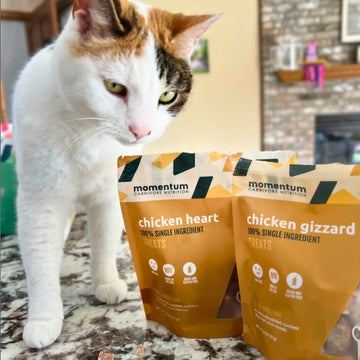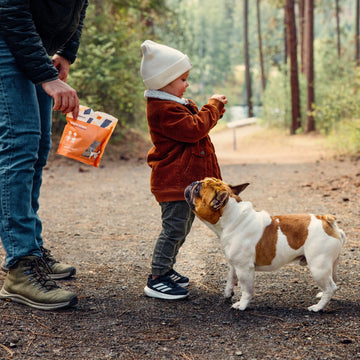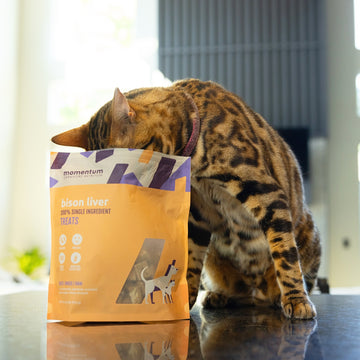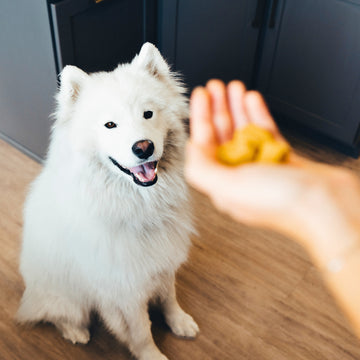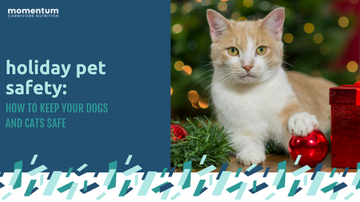

What Are Freeze-Dried Dog Treats? Understanding the Benefits of Raw Nutrition
Freeze-dried pet treats from Momentum Carnivore Nutrition are a wholesome and nutrient-rich option for both dogs and cats, crafted from the raw proteins that your pets instinctively crave. We use high-quality meats such as beef, chicken, duck, bison, pork, turkey, and salmon, ensuring that all the natural goodness is preserved for your pet’s well-being through our specialized freeze-drying process.
Our freeze-drying process begins by rapidly cooling the meat to ultra-low temperatures, preserving its natural form and locking in vital nutrients. As the temperature drops, ice crystals form within the meat, effectively capturing the essential vitamins and minerals that your dog’s and cat’s bodies need.
During the primary drying phase, we gently heat the meat in a vacuum chamber, removing about 95% of the moisture while maintaining the integrity of the nutrients. This ensures that the treats remain lightweight and easy to handle, without sacrificing any of their nutritional value. In the secondary drying phase, we eliminate any remaining moisture, creating a porous structure that is ideal for quick rehydration and full flavor retention.
Finally, the freeze-dried treats are immediately packaged to maintain their freshness and quality, so your pets can enjoy the benefits of raw, nutrient-dense treats in every bite.
Choosing freeze-dried treats from Momentum Carnivore Nutrition means giving your dog and cat the best of nature in a convenient form. Our treats are not only rich in flavor but also packed with essential nutrients that support your pet’s overall health. Unlike traditional treats that often contain fillers and preservatives, our freeze-dried treats are pure and natural, making them a superior choice for pet parents who want to provide optimal nutrition.
By selecting freeze-dried treats, you’re ensuring that your pets enjoy a healthy snack that’s as close to raw as possible, without the mess or inconvenience. Whether you’re training, rewarding, or simply treating your dog or cat, our freeze-dried options are a perfect choice for a happy, healthy pet.
Absolutely! Our freeze-dried treats are made from premium, human-grade ingredients and undergo rigorous quality control to ensure safety and nutritional integrity. The freeze-drying process effectively removes moisture while locking in the nutrients, so you can trust that you’re giving your dog and cat a safe, healthy, and delicious treat.
To keep your pet’s freeze-dried treats fresh and tasty, store them in a cool, dry place away from direct sunlight. Once opened, make sure to reseal the packaging tightly. Proper storage ensures that the treats maintain their quality and flavor for an extended period, giving your pets the freshest, most nutritious snack possible.
How Much to Feed:
Feeding freeze-dried treats to your pets should be done in moderation, considering their size, age, and daily caloric intake. These treats are nutrient-dense, so a little goes a long way. Here’s a general guideline:
- Small Dogs and Cats: 1-2 pieces per day
- Medium Dogs: 2-4 pieces per day
- Large Dogs: 4-6 pieces per day
Always adjust the portion size based on your pet’s individual needs, activity level, and overall diet. If your pet has specific dietary restrictions or health concerns, consult with your veterinarian before introducing new treats.
How to Feed:
- As a Treat: Feed the freeze-dried treats directly from the package as a quick reward or snack. Their crunchy texture and rich flavor make them an irresistible option for both dogs and cats.
- As a Meal Topper: Add a few pieces to your pet’s regular meals to enhance the flavor and nutritional value. Simply crumble the treats over your pet’s food, and watch them enjoy a mealtime boost.
- Rehydration (Optional): If your pet prefers a softer texture, you can rehydrate the treats by soaking them in a small amount of warm water for a few minutes. This is especially beneficial for older pets or those with dental issues.
- Training Rewards: Use the treats as a high-value reward during training sessions. Break the treats into smaller pieces to extend training time without overfeeding.
Tips for Feeding:
- Always provide fresh water when giving your pet freeze-dried treats, especially if you opt to feed them dry.
- Monitor your pet to ensure they are chewing the treats properly, particularly for larger pieces.
- Store the treats properly to maintain their freshness and flavor, ensuring your pet gets the best experience every time.
Feeding your pets Momentum Carnivore Nutrition freeze-dried treats is a simple and enjoyable way to add natural, nutrient-rich snacks to their diet. Whether you’re rewarding good behavior, enhancing their meals, or just treating them to something special, these treats are a healthy choice that both dogs and cats will love.
Momentum Pet Points Rewards Program
Join our Momentum Pet Points Rewards Program and get rewarded for treating your pet to the best! Earn points every time you shop, refer friends, and engage with us—then redeem them for discounts, free products, and exclusive perks.
Start earning today and turn every purchase into more rewards for you and your pet!
Step 1: Create an Account
- Visit MomentumCN.com.
- Click on the Pet Points Rewards account icon in the bottom right corner.
- Select "JOIN NOW" and enter your name, email, and a secure password.
- Click "Create Account" to complete your registration.
Once registered, you’ll automatically start earning points by:
✅Making Purchases– Earn points for every dollar spent.
✅Referring Friends– Share your referral link and get rewarded.
✅Following Us on Social Media– Engage with us and earn extra points.
✅Leaving a Product Review– Share feedback and receive bonus points.
- Log in to your account and go to the Pet Points Rewards section.
- Check your points balance and available rewards.
- Select your reward and apply it to your next order at checkout!
